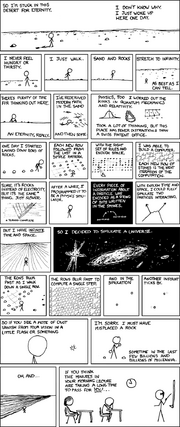- 10,884
- 12,300

I made a revision thread some time ago, but I think that was probably too complicated and wordy and didn't go anywhere (with its 2 or something replies), so let's redo this with me restricting myself to some simpler points.
On the right you find all feats of the character.
For those not familiar with Turing Machines let me summarize what happens as follows:
An immortal human derives the entirety of the laws of physics and then uses that knowledge to run a very slow simulation of an universe on a computer. This universe is can be speculated to be the normal human universe.
With that on to the revision:
Stat upgrade
The current stats come from the fact that he can edit only one particle at a time.
However in that case you might as well downgrade any other character that destroyed/reprograms virtual worlds because they destroy/reprogram them one Bit at a time.
To that comes that if cueball simply stops moving the simulation stops, ending the universe as consequence. In other words he can freely pull the plug to the universe simulation and by that erase the universe.
Given that he should be 3-A.
Infinite speed downgrade
The infinite speed is given because if he doesn't do the steps in the simulation the universe won't progress. The problem with that assessment is obvious: If any character resists his power, or in other words isn't dependend on being simulated by cueball, he would fight a cueball with the speed of a normal human.
The difference is basically like the difference between an infinitely fast character and a character with passive time stop. It seems the same as long as nobody resists, but in fiction it makes a huge difference.
Intelligence downgrade
Supergenius seems appropiate, nigh-omniscient not.
Since I wish to avoid the long winded explanation on turing machines I gave in the last thread let's just say: A programmer can run a game he made on a computer and yet he would not be nigh-omniscient regarding that game given that he does not actually know everything that happens in a moment, but only the rules (sourcecode) based on which the things happen. For example a programmer could not tell you the optimal way to go through a level or how a set of complicated interactions between game objects will end up (otherwise physics simulations would be useless....).